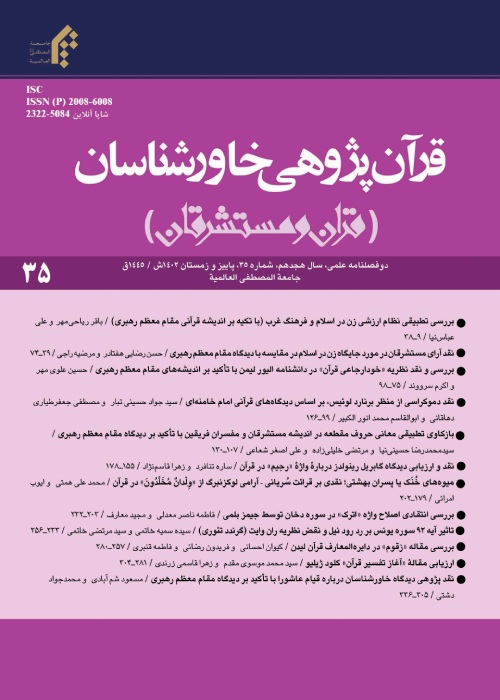A Critical Analysis of Gabriel Mendel Khan’s Views on the Enchantment of the Prophet (s)
The need to analyze the views of Orientalists about the Prophet (s) is indispensable today, since Western exposure to Islam is through the eyes of their scholars and is reflected in art, politics and other social aspects. The enchantment of the Prophet is one of the subjects that, if accepted, may result in attacks on the very essence his prophethood. As such, the present study seeks to answer the central question concerning the alleged enchantment through a documentary study. Gabriel Mendel Khan is one of the pioneering scholars who has studied Islam for a long time. His most important views on this subject are: confirmation of the Prophet’s enchantment or physical illness as a result of magic, considering certain surahs of the Qurʾān to be talismans, the duality of introducing the Muʿawwidhatān (Surah al-Falaq and Surah al-Nās) as Makkī or Madanī, not paying attention to Shīʿī sources on the subject, ignoring the consequences of accepting that the Prophet (s) was enchanted by magic, and failure to incorporate other possible contexts of revelation of the particular verses and the explanations of the infallibles, all of which has led Mendel Khan to endorse the view of the Prophet’s enchantment. The Prophet (s) was chosen by God and had the ability required to fulfill his responsibility. Despite the Qurʾān’s emphasis on this, some exegeses quote traditions that state the Prophet (s) had been bewitched by a Jew. The opinions of exegetes on this matter differ. Some of them accept that he had been bewitched while others explain the verse through other means aside from bewitchment. However, they all believe that the Prophet was protected from magic in matters pertaining to his responsibility of teaching the people about Divine revelation and law. If Surah al-Falaq is Madanī, it is compatible with the narrations of his being enchanted by a Jew from Madīnah; on the other hand, some consider it Makkī. Surah al-Falaq and al-Nās are together known as Muʿawwidhatān, yet they have not been called talismans. The conclusion we derive is that Mendel Khan considers the enchantment of the Prophet to be the only valid interpretation whereas the occasions of revelation and exegeses of the verses of Surah al-Falaq raise doubts about this interpretation, even if bewitchment is [generally] something possible.
- حق عضویت دریافتی صرف حمایت از نشریات عضو و نگهداری، تکمیل و توسعه مگیران میشود.
- پرداخت حق اشتراک و دانلود مقالات اجازه بازنشر آن در سایر رسانههای چاپی و دیجیتال را به کاربر نمیدهد.


